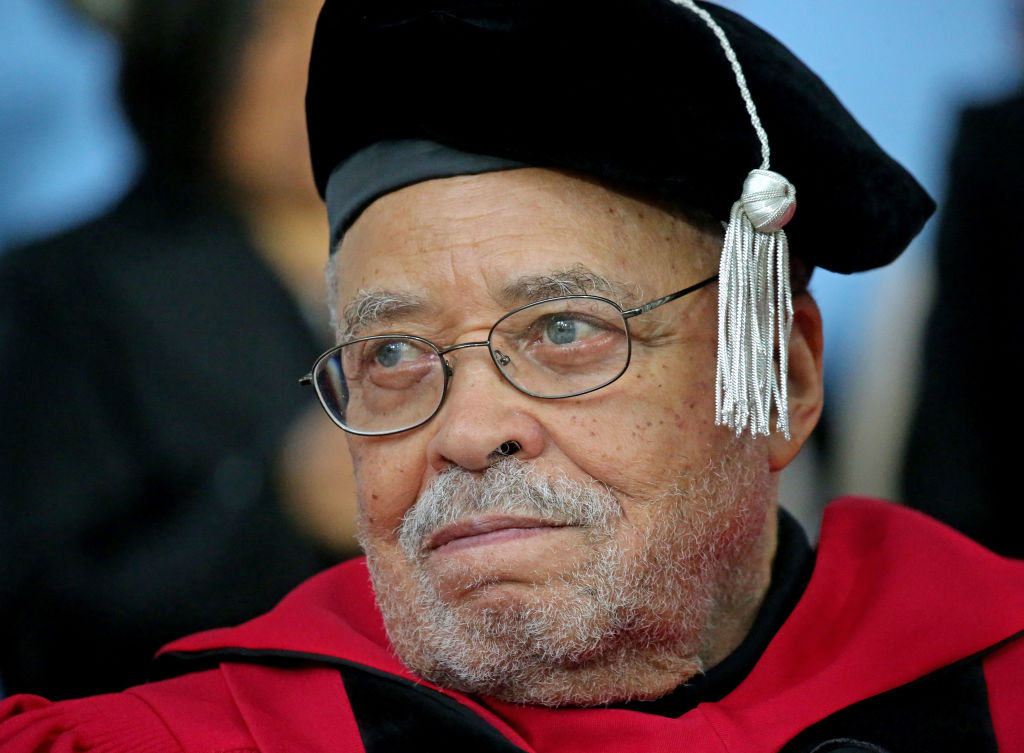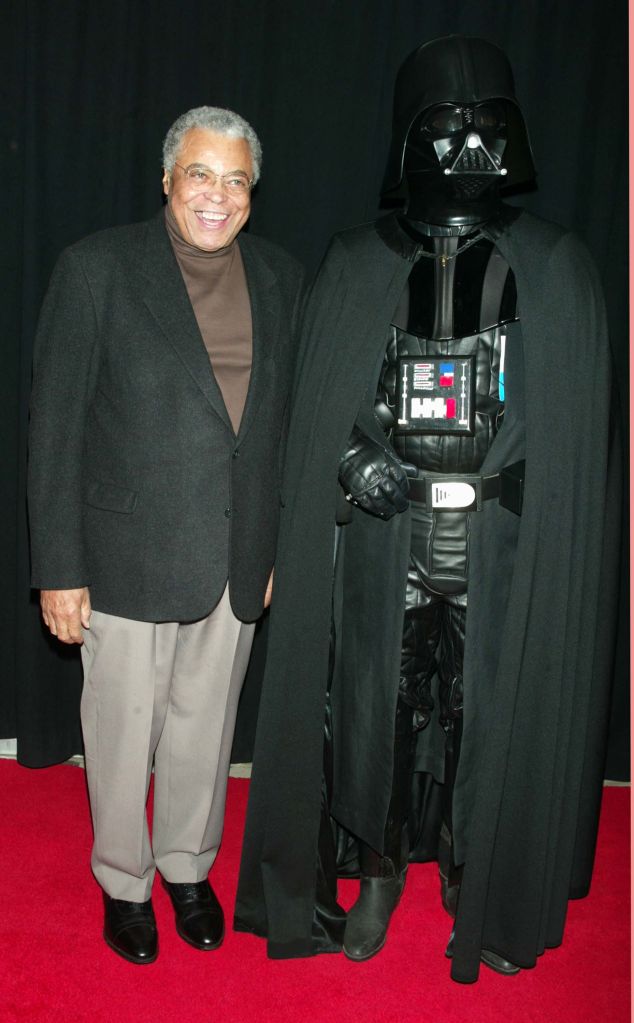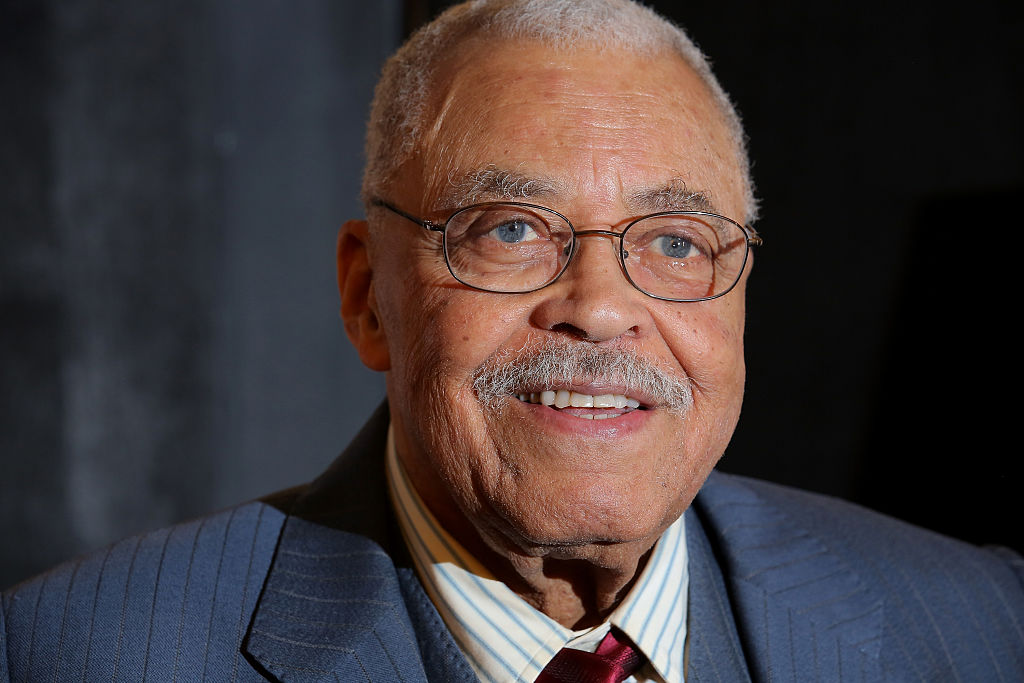James Earl Jones: 5 Moments He Gave Us That Will Live With Me Forever

Jones received an honorary Doctor of Arts from Harvard University in May, 2017Source: Boston Globe / Getty
I was four years old the first time I saw James Earl Jones. I was watching a film I had no business watching; 1986’s Soul Man. The comedy followed Mark, a privileged white college grad who resorted to darkening his skin to earn an all-Black scholarship to Harvard Law School.
The film couldn’t made today. It plays on tired racial stereotypes and uses Blackface as the key component of its plot point. But James Earl Jones is the character I remembered from the film. His performance stood out as the erudite Professor Banks, the law school instructor portrayed by James Earl Jones, who died Monday at 93.
Jones played him as a stoic, no-nonsense law teacher. His tone, never elevating higher than what’s deemed “an inside voice” evoked a man not to be played with, who pulled no punches. The most memorable scene is when Mark can’t hand in an assignment after being wrongfully arrested and beaten up in a holding cell by racist white men. After the Banks reminded him there were no excuses for late assignments, Mark tried to appeal to him as “Black man to Black man,” to which he got a rude awakening.
“You will get no special treatment from me, Mr. Watson,” Jones playing Banks scolded. “Do you hear me? No special treatment. And that means, if you have to work twice as hard as these little white shits, then you damn well better work twice as hard.”
Only an actor with a voice that matches his physical stature with that much gravitas and presence could affect me as profoundly as the way that moment did. It affected my sense of what the craft should be, period. It’s stunning to recall that Jones, a Mississippi-born boy with a stutter, grew up to become one of the most rare and resonant voices and versatile and successful actors in history.

Source: Sylvain Gaboury / Getty
A Black Renaissance
As part of a legendary peer group of Black actors of the 1950s and 1960s that included Sidney Poitier, Cicely Tyson, and Harry Belenfante, Jones was a dynamic actor of stage and screen. More than anything, it was his management of his great baritone voice that inspired, scared, and engaged audiences for decades in dramas and comedies alike, like Claudine, A Piece of the Action, The Great White Hope, Meteor Man, Conan The Barbarian, Field of Dreams, and much more.
But it was never about Jones’ voice only. It was his management of his majestic baritone that inspired, scared, and engaged audiences for decades in dramas and comedies alike, from Claudine, Star Wars, The Lion King, A Piece of the Action, The Great White Hope, Meteor Man, Conan The Barbarian, Field of Dreams, and so many more.
Jones mixed with the pacing, intonation and final delivery of his lines so masterfully, that even as we recognize the voice each time we heard it, we would to associate it only the character he embodied in that moment. So many actors with a distinguishing trait are pigeonholed into playing the same character in different productions. But Jones was just as believable as Darth Vader as he was Mufasa– or Troy Maxson on stage in August Wilson’s classic play, Fences. There are lines so impeccably delivered by him, that not only can I not imagine another actor saying them and having me–or anyone else–remember them, honestly I cannot actually even really imagine another actor saying them at all.
That majestic skill earned him a rare honorific: with Tony, Emmy and Grammy Awards–and then the Academy Award Lifetime Achievement Award in 2011, Jones was an EGOT. In 2022, the Cort Theater where Jones made his Broadway premiere, had its name officially changed. It is now fittingly named the James Earl Jones Theater for the man who earned honor and award the Black way: with discipline, dedication and the absolute determination to become a master of his craft.
The 5 James Earl Jones Moments That Will Live With Me Forever
1. From the first Star Wars film:
“I find your lack of faith disturbing.”

Source: Jim Spellman / Getty
Thanks to Jones’ voice, Darth Vader of the Star Wars saga is considered, as mentioned by the Beyond The Dune Sea podcast, “the most recognizable villain in Western fiction.” When thinking of iconic lines from Jones’ multiple iterations of the role across the saga’s chapters, I often hear people say it’s the pivotal moment in 1980’s The Empire Strikes Back when he reveals to the hero, Luke Skywalker, “I am your father.”
It was a powerful line but for me, his most chilling, memorable one is spoken in the first film, 1977’s Star Wars. Jones’s deep, commanding voice is central to this moment, as Vader reprimands an Imperial officer who questions the power of The Force, an omnipresent energy field that is the source of his immense power.
Vader then uses The Force to suffocate the officer, as he says to him, “I find your lack of faith disturbing.”
The menacing calm of his Jones’ delivery with its undercurrent of intimidation, creates a stark contrast to the officer’s growing panic as he suffocates. Jones’voice makes Vader’s control seem effortless yet terrifying, underscoring the character’s immense power and disdain for dissent. The line’s delivery, cold yet filled with unspoken threat, adds to the mystique and fear surrounding Darth Vader, cementing him as one of the most iconic villains in cinema history.
2. From Coming to America
“My son works?!?!”

Source: Ernesto Distefano / Getty
In the 1988 film Coming to America, James Earl Jones, playing King Jaffe Joffer, delivers the line “My son works?” with a blend of astonishment and indignation. His deep, resonant voice amplifies the humor and gravity of the moment, capturing the king’s disbelief that his royal son, played by Eddie Murphy, would lower himself to take on a common job. Jones’s authoritative tone, known for its commanding presence, underscores the vast gap between the opulent world of royalty and the modest, hardworking lifestyle his son has embraced. The weight of his voice enhances both the comedic absurdity and the character’s deep pride, making the line memorable and impactful.
3. From Fences, the Broadway Production
“I ain’t got to like you!”

Source: Afro Newspaper/Gado / Getty
In the Broadway play Fences, James Earl Jones portrays the character of Troy Maxson, a stern and embittered father. Jones’s powerful, commanding voice elevates the tension in this pivotal scene, where Troy harshly explains to his son that a father’s duty is to provide, not to like his child or to be liked by his child. His deep, resonant voice delivered the line, “I ain’t got to like you” with raw intensity and emotional depth that emphasizes the harsh realities of life, especially for a Black man in 1950s America, and conveys the weight of Troy’s own struggles and disappointments, which projected onto his son. The gravity and authority in Jones’s delivery lend a sense of inevitability and bitterness, robbing his son of a future beyond Troy’s harsh present. It makes the moment striking and unforgettable, embodying Troy’s complex mixture of frustration and stoicism.
4. From The Lion King
“Remember who you are. You are my son, and the one true king.”

Source: Stephane Cardinale – Corbis / Getty
In direct contrast to Troy from Fences, in the 1994 animated Disney film, The Lion King, Jones voiced Mufasa, a masterful combination of stateliness, wisdom, strength, nurturing, gentility, and love. After his murder, Mufasa’s spirit returns in the clouds to convince his exiled son, Simba, to return home to regain control of his kingdom. Before his image fades, he delivers the powerful line, “Remember who you are. You are my son, and the one true king.” It’s Jones who gave the gravitas and emotional depth to the scene,.The rich timbre of Jones’s voice embodies wisdom, fatherly love, gentleness and firmness. It’s ethereal and makes Mufasa timeless–and inspirational.
5. From Roots: The Next Generation
“Kunta Kinte! I found you!”

Source: Walter McBride / Getty
In the mini-series Roots: The Next Generation, Jones stars as Alex Haley, the real-life author tracing his ancestry back to Africa. In the final episode, Haley, who was able to connect the dots of his relatives’ oral family history back to the Gambia, where a village griot reveals that his ancestor, Kunta Kinte, hailed from that village. Jones delivers the line “Kunta Kinte! I found you!” with a potent mix of triumph and emotional release, pouring years of longing and determination into this climactic moment. His delivery carries the weight of history and the fulfillment of a generational search for identity and roots.His voice is so powerful in this moment, we feel the personal victory for Haley but our own profound connection to and desire for, a known heritage. Jones made the moment both cathartic and inspiring.
SEE MORE:
Broadway Theater To Be Renamed After Trailblazing Actor James Earl Jones
Sidney Poitier, First Black Man To Win Academy Award For Best Actor, Dies At 94
The post James Earl Jones: 5 Moments He Gave Us That Will Live With Me Forever appeared first on NewsOne.





